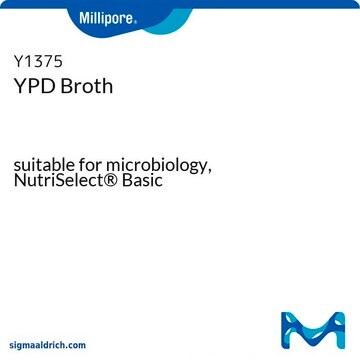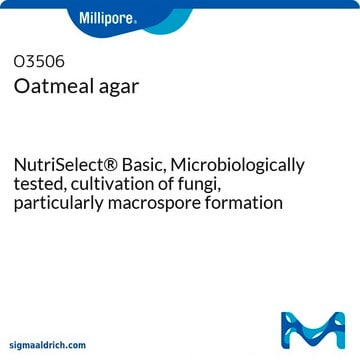P6685
Potato Dextrose Broth
suitable for microbiology, NutriSelect® Basic
Sign Into View Organizational & Contract Pricing
All Photos(1)
About This Item
UNSPSC Code:
41171607
NACRES:
NA.74
Recommended Products
sterility
non-sterile
Quality Level
form
powder
composition
Dextrose, 20 g/L
Potatoes, Infusion from, 4 g/L
manufacturer/tradename
NutriSelect® Basic
technique(s)
microbiological culture: suitable
final pH
4.8±0.5 (25 °C)
application(s)
food and beverages
microbiology
suitability
bacteria
molds
yeasts
General description
Cultivation of bacteria, fungi, yeast and molds
Application
Potato Dextrose Broth has been used in the cell culture of fungal strains.
Components
Contains infusion from potatoes plus glucose.
Preparation Note
Solve 24.0 g in 1 litre distilled water. Autoclave 15 minutes at 121°C.
Analysis Note
Microbiologically tested.
Footnote
We offer two media types: the superior granulated GranuCult® and the cost-efficient powdered NutriSelect® culture media, depending on your needs.
The designations basic, plus, or prime are added to indicate the quality control level, from basic quality control to standard QC plus to prime for full regulatory compliance.
The designations basic, plus, or prime are added to indicate the quality control level, from basic quality control to standard QC plus to prime for full regulatory compliance.
Legal Information
GRANUCULT is a registered trademark of Merck KGaA, Darmstadt, Germany
NutriSelect is a registered trademark of Merck KGaA, Darmstadt, Germany
Storage Class Code
11 - Combustible Solids
WGK
WGK 1
Flash Point(F)
Not applicable
Flash Point(C)
Not applicable
Choose from one of the most recent versions:
Certificates of Analysis (COA)
Lot/Batch Number
Don't see the Right Version?
If you require a particular version, you can look up a specific certificate by the Lot or Batch number.
Already Own This Product?
Find documentation for the products that you have recently purchased in the Document Library.
Customers Also Viewed
Walaa K Mousa et al.
Frontiers in plant science, 6, 805-805 (2015-10-27)
Wild maize (teosinte) has been reported to be less susceptible to pests than their modern maize (corn) relatives. Endophytes, defined as microbes that inhabit plants without causing disease, are known for their ability to antagonize plant pests and pathogens. We
Dewi R Davies et al.
Journal of experimental botany, 57(8), 1817-1827 (2006-05-25)
The present understanding of ROS generation in the defence response of Arabidopsis thaliana is reviewed. Evidence suggests that the apoplastic oxidative burst generated during basal resistance is peroxidase-dependent. The ROS generated during this basal resistance may serve to activate NADPH
Amy Baetsen-Young et al.
The Plant cell, 32(2), 336-351 (2019-12-20)
We exploited the broad host range of Fusarium virguliforme to identify differential fungal responses leading to either an endophytic or a pathogenic lifestyle during colonization of maize (Zea mays) and soybean (Glycine max), respectively. To provide a foundation to survey
Alec M Judd et al.
Applied and environmental microbiology, 84(17) (2018-06-24)
Animal-associated microorganisms (microbiota) dramatically influence the nutritional and physiological traits of their hosts. To expand our understanding of such influences, we predicted bacterial genes that influence a quantitative animal trait by a comparative genomic approach, and we extended these predictions
Hsin-Bai Yin et al.
Poultry science, 94(9), 2183-2190 (2015-07-29)
Aflatoxins (AF) are toxic metabolites primarily produced by molds, Aspergillus flavus and Aspergillus parasiticus. Contamination of poultry feed with AF is a major concern to the poultry industry due to severe economic losses stemming from poor performance, reduced egg production
Our team of scientists has experience in all areas of research including Life Science, Material Science, Chemical Synthesis, Chromatography, Analytical and many others.
Contact Technical Service










